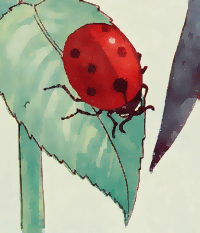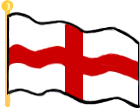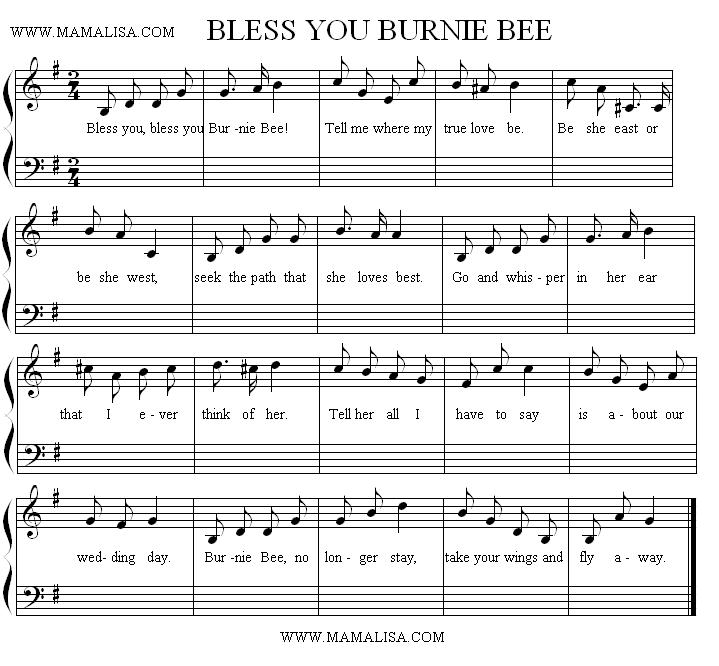Burnie Bee, Burnie Bee
En unos lugares de Inglaterra del norte, "burnie bee" se refería a una mariquita.

Burnie Bee, Burnie Bee
Mariquita, mariquita
Rima
Rima
(Inglés)
(Español)
Burnie bee, burnie bee,
Tell me when your wedding be?
If it be to-morrow day,
Take your wings and fly away.
Mariquita, mariquita,
¿Cuándo será tu boda, dime?
Si viene a ser mañana,
Toma el vuelo y vete.
Notas
La versión de Harry's Ladder to Learning (1850) es algo diferente:
Bless you, bless you, bonnie bee:
Say, when will your wedding be?
If it be to-morrow day,
Take your wings and fly away.
Traducción
Sé bendita, sé bendita, mariquita:
¿Cuándo será tu boda, dime?
Si viene a ser mañana,
Toma el vuelo y vete.
He aquí información sobre cómo "burnie bee" es una mariquita (también llamada "lady-bird") en el norte de Inglaterra:
Mother Goose's Melodies for Children, Or Songs for the Nursery With Notes, Music, and an Account of the Goose Or Vergoose Family por Henry Louis Stephens, Gaston Fay (1869), dice…
"Burnie bee es el nombre que se da a la mariquita en el norte de Inglaterra. Los versos los dicen los niños cuando tiran el bichito en el aire para que se vuele. Variaciones de esta canción son corrientes por el norte de Europa."
James Orchard Halliwell escribió en "Popular Rhymes and Nursery Tales" (1849):
"En Norfolk la mariquita se llama 'burny-bee' y los versos siguientes son corrientes: (misma traducción que más arriba)
Burnie bee, burnie bee,
Tell me when your wedding be.
If it be to-morrow day,
Take your wings and fly away."
Hallamos lo siguiente sobre Burnie-bee en Notes and Queries (25 de enero de 1902)…
"En Norfolk la mariquita se llama burnie-bee por contracción de burnie-beetle o fiery-beetle. Allí, los niños dirigen el discurso siguiente al bicho:
Bless you, bless you, burnie-bee,
Tell me where my true-love be ;
Be she east, or be she west,
Seek the path she loveth best :
Go and whisper in her ear
That I ever think of her ;
Tell her all I have to say
Is about our wedding-day.
Burnie-bee no longer stay ;
Take your wings and fly away.
Traducción
Sé bendita, sé bendita, mariquita,
¿Dónde está mi amor? dime,
Esté al este, esté al oeste,
Busca el camino que prefiere;
Ve y al oído murmúrale
Que pienso en ella siempre;
Dile que todo lo que tengo que decir
Trata de nuestra boda por venir.
Mariquita, no tardes más,
Toma el vuelo y vete."
Notes and Queries tomó la rima de The Monthly Magazine or British Register (1814). La 2a ilustración es la de esta versión de la rima.

Agradecimientos
Uno puede hallar esta rima en The Real Mother Goose (1916), ilustrado por Blanche Fisher Wright.




